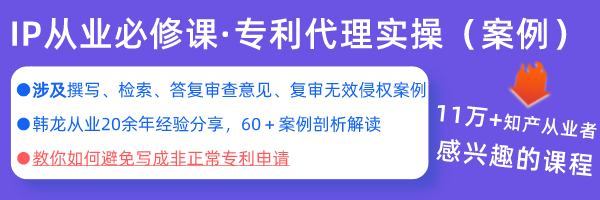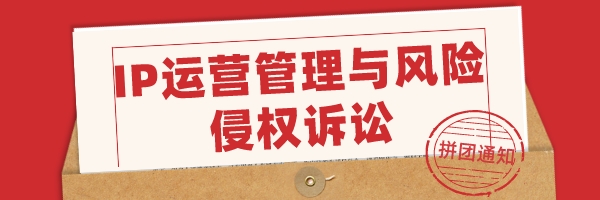本帖最后由 Joyce 于 2011-5-15 19:43 编辑 PATENT SEARCHING SITE WORLDWIDE
以下内容摘录自Linkedin网站,在这个关于世界专利检索免费资源的讨论中,提及了哪些专利检索网站呢?你是否使用过? 有何评价或不同见解呢?
本次线上活动奖励规则:1、人工奖励: A 回帖找出话题讨论中提及的网站,并简要说明其优势,缺陷(中文表述)。根据答案完整性,给予1—3个果子奖励; B 在此话题之外,你还了解哪些提供免费专利检索的网站呢?提供链接和简要描述,即可获得1—3个果子奖励2、系统自动奖励: 回帖时,系统自动就有1个果子奖励哦,中奖率为50%,设置中奖总数为5,每人次最多中奖1次。
Nancy的提问:
I would like to have some comments on the searching site "freepatentsonline". Is it worth searching there if someone wants to use a free database? How comprehensive it is?
George Chang • My suggestion is that the difference is not which database you are using for your search, it's the keywords you are using when filling in the search fields. In my opinion, there's much difference in the database.
Dov May• i use it. its easy to use - and provides good searches. But George is right - the keywords you choose make all the difference.
Art Nutter Different sites use different algorithms. One of the best sites we use is Enlyton. Free, or course.
Deane Elliott • As the owner of a professional patent research company, I would suggest having a search done by a professional if you are seeking to locate the most relevant prior art available. Relying on keywords for search results is a risky practice. I cannot tell you how many of our clients (mostly attorneys and corporations) identify prior art that they have located using keywords only to have us find 102 art that they did not locate. The classification system established by the PTO enables us to locate art that would not otherwise be discovered. A professional researcher will review patents in a relevant classification patent by patent rather than relying on keywords. If I need a plumber, I call a plumber. If you need a patent search, you should rely on a professional researcher. When you compare the cost of a patent application to the cost of a professional search, it makes sense to call a professional.
Paul Fishbein • "Freepatentsonline" is not the best or worst database. Why not use the USPTO database, which is free, and search first by keywords to get some leading references followed by a classification code search as Deane Elliot suggests? I have become fond of using "Patent Lens" as it is quite complete and is only about a week behind the USPTO for US patents and applications.
Nancy Kapil • Thanks all for the suggestions. Yeah, I agree. That more than the database, the search depends on the strategy one uses. USPTO provides with US patents only. Its good though, but I want a worldwide scope.
Saurabh Lal • Hey Nancy, you may try
Patent Lens and
Espacenet, both are good sources, specially when you are looking for a worldwide search.
Nancy Kapil • Hi Sir, Well I do search on espacenet. Along with this, I search on freepatentsonline and for PCT i look into WIPO. Would try patentlens this time, since I have got good recommendations from people. Thanks.
Barry Eagar • I think that if your client is paying you to do a search, you should really consider a professional service (see Deane's comment) or you should use a paid service, such as Delphion. They have a one-day pass for US$50 which I think is good value. I am not in any way associated with Delphion, so this is an unbiased opinion. I would first browse around on some of the free sites, including USPTO and Espace to get an idea of classifications and keywords. Once you have a search strategy sorted out, hit Delphion. On the other hand, if you're on a tight budget and are doing research for yourself, I think Freepatentsonline is good. Patent lens only has access to 10 million patents? Doesn't seem enough to me.
Deane Elliott • Thanks Barry. One of the strengths of using a professional patent search service is that those of us that conduct the searches at the USPTO are accessing the most powerful search tool for searching US patent and publications BAR NONE! Anyone that has seen EAST will confirm that the flip rate page-to-page is faster than any other system out there and allows viewing of full images faster than your brain can comprehend them. When I was trained to search patents over 23 years ago, I was taught that a professional patent searcher will view every drawing of every patent in a relevant subclass. Not doing so is risky as alternate embodiments are often buried in the many pages of drawings. We currently use Orbit.com to access foreign art that is not available on EAST via ECLA. There is no comparision between the speeds of EAST (not internet based) versus a web-based database such as Thompson, Orbit, etc. Having said that, I think Orbit is one of the most economical and comprehensive for-fee web-based search tools out there.
Andrew Johnson • If you're looking for a worldwide search, pay close attention to which data are included on the free databases; neither freepatentsonline nor patentlens currently include EU national office applications (as far as i can tell).
Good luck
Keith Leaman • I am a Chartered Patent Attorney with over 40 years experience working in the UK. In my experience , no matter what search database you use, the search is only as good as the searcher diong the search. If you want a quick overview, the free search databasess are OK (eg Espacenet, or official free databases like the UK or USPTO databases) but if you need to rely on the results, then it is more cost effective to use a good professional searcher. I have found that those clients that use the free patent databases fail to search other sources and often come to a false sense of security and are utterly shattered when other prior art comes to light. A good professionals searger will not restrict their searches to patent databases (unless you instruct them to do so) but will use all resources at their finger tips.
Joseph Komen• Keith, what other resources might be available?
Deane Elliott • Keith, I completely agree with you. In addition, if an attorney or agent misses a 102 by searching the invention inhouse, how does one go about explaining that to the applicant? I understand that disclaimers would be built into the report, but it can't look good for the agent/attorney. Lastly, a professional patent searcher's billing rate is much less than an attorney's so he/she can spend more time on it to stay within the search budget. It just makes good sense to have it done by a search firm.
Vagelis Hristidis• All the points are good. I am an Associate Professor of Computer Science specializing in searching databases. The quality of the search results depends on both the keywords or other conditions used by the searcher and on the search algorithms of the search engine. The goal of searching research is to allow non-expert users to locate the information they need. For that, techniques like semantic ranking, query expansion, smart results navigation, filtering, and results' snippets are employed.
Searching for patents is different than searching the Web: you don't hire an expert to search Google for you. Hence, building a mini Web-style search engine on top of a patents database, which most engines out there do, is not the best solution.
My research has focused on how to build domain-specific search engine
(see http://users.cis.fiu.edu/~vagelis/presentations/InformationDiscoveryonVerticalDomains.pptx for a relevant presentation I gave).
We have been working on http://PatentsSearcher.com, which is a free system to search international patents. We have put much of the cutting-edge research on domain-specific search into the system. I am particularly proud of our new beta system (see link from home page) where we have tons of new functionality. I would love to hear your feedback.
Deane Elliott • Thanks for your reply Vagelis. I acknowledge the importance of search engines and symantic processors. However, I think an important aspect of patent searching is the professional searcher's knowledge of what constitues a 102, how to piece together a 103 (from the Examiner's perspective), identification of analagous art etc. The average inventor that is advised to do his own searching on the internet via freepatentsonline, Google patent, etc. (after purchasing a how-to book) has no realistic understanding of these things and will not be able to conduct his/her own search. He/she may find a piece of prior art that a patent attorney could easily draft claims around but they may give up instead. Any time I work with an individual inventor (not very often), I highly recommend they take our search results to an attorney/agent so that they can be evaluated.
I often use this analogy when explaining the difference between classification searching and keyword searching. If one is searching for a ball valve structure, he can enter terms like "ball, valve, seat, handle, spring" and limit to title, abstracts and claims. I have not done this lately but I would imagine this might render results of tens of thousands of patents. Additionally, one has to be concerned about the cutoff date of the databases used. There are plenty of ball valve patents back in the late 1800's and early 1900's that would be relevant prior art. The only way to effectively conduct a search on the proposed ball valve is to manually search the ball valve class/subclass patent-by-patent while reviewing drawings.
Philip Steiner• I use Freepatentsonline extensively... not so much for searching, but for downloading of pdf versions of patent references cited in an office action. In terms of searching, anyone using keywords alone is making a great mistake. Patent references are organized by class/subclass (i.e., alphanumerically). Searching by keywords may find some references but other references not using the specific keywords would not show up.
Damien Loveland• Freepatentsonline is a very good database and both a classification search and a general web search can improve results. Several times I've searched for obscure inventions and not found any close patent literature, yet I've found relevant material on a 'how-to' site or in responses posted in a forum.
Nancy Kapil • Thanks again all of you for your suggestions and participation in this forum.
Vagelis, I will definitely go through the link you have mentioned, and would get back to you accordingly. Thanks for this.
Well, I would like to say this, that the reason for me to ask this was that I have started my career in IPR and doing the IPR related services. I do not have access to paid websites for now, hence the ques. for free website came out. I go through many patents daily in the desired domain. And as many of you have mentioned, yes, it largely matters on the strategy I am using. I start with the keyword search, followed by classification. And have always gained success in finding a strong prior art. The difficulty lies at the point, when you need to decide where to end your search and on which conclusion, when a substantially strong prior art is not available.
Amit Aggarwal• Nancy, Where to stop the search depends on the purpose of the search and the budget/stakes involved. It is the most difficult decision for a searcher and one can only learn this art with experience. Following are some tips that may help you, but again don’t use them till you are confident of the subject matter and your searching skills.
If it is a novelty/patentability search, I would stop if I get a novelty destroying document. If I can’t find one after searching through the relevant class/subclass and obvious keywords, I will identify the main competitors in that technology and conduct broad patent/literature/product search on them. Still if I don’t get a useful result, I report the same to client and inform him that there are more options but it will cost more.
For an invalidity search (especially litigation cases), in addition to above mentioned steps, I would do a thorough two level citation analysis. Moreover, will also search by using only keywords and would restrict the search not to include the obvious classes (already covered in first step). I have seen number of cases where the most important art is found in the most unrelated class. There are many more checkpoints that should be checked for invalidity analysis, such as, fee payment, correct entity status, reporting of know references etc.
In the end, as I said earlier, stakes involved govern the search and the budget approved governs where to stop.









微博评论
2011/05/15 19:30 [来自山东省]
0 举报lawis4losers
Elliott说坐检索用专商局给的分类来做好过用关键词,也许是中英文专利检索的差异吧,我怎么感觉做中文专利检索关键词更好用呢,果汁局的审查员做熟了的也是喜欢直接用关键词,甚过IPC的。
免费的检索网站?Soopat,智慧芽,佰腾?
2011/05/15 19:36 [来自湖北省]
0 举报yongq2008
大多没有用过
2011/05/15 20:17 [来自四川省]
0 举报zjgyp
2011/05/18 03:40 [来自浙江省]
0 举报Arrow
2011/05/18 09:00 [来自广东省]
0 举报gevered
http://www.patentlens.net/daisy/patentlens/patentlens.html
http://www.ipexl.com/zh/advancedPatentSearch
http://www.freepatentsonline.com/search.html
http://www.pat2pdf.org/
http://zh-cn.patents.com/
http://www.patentstorm.us/
http://www.priorsmart.com/
http://www.patentexplorer.com/
http://www.wipo.int/patentscope/ ... 99F2F71FDD58C.wapp2
2011/05/18 15:24 [来自山东省]
0 举报